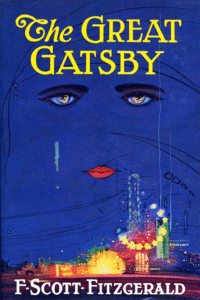Titanic (1997) is, in Shakespeare's phrase, "too much of water." The movie sinks long before the ship does. If the dewily pubescent love story doesn't interest you (in other words, if you're older than 16), there's not much else to do but observe the cold impressiveness of the production. The set design is pretty, but you're not sure what's real and what's CGI, and sooner or later you give up trying to figure it out. An awful lot of people are running around onscreen, but they're just a lot of mice against the gigantism of the movie's megaproduction (although a group of them later drown like rats below deck).
 |
| Dewy young love. Leonardo DiCaprio and Kate Winslet |
There are good guys and bad guys, bar-room brawls, fiery sunsets, Irish rogues, snooty Brits, a plucky American gal named Molly Brown, and a Hallmark-weepy framing device: the lovely young woman is now a sentimental old woman telling her story to a science team exploring the wreck. She throws her keepsake into the waves and watches it sink. It's all a big blur. Nonetheless, I was able to collect my thoughts during several of the scenes, including the awesome moment of impact, when shards and chunks of the iceberg catapulted onto the ship and skidded along the deck. The two young lovers make love in an automobile in the cargo area, and my memory flashed back to the same scene in
Now, Voyager (1942) which, despite that film's exhausting length, was much more to the point. Just too damn much water everywhere: I got queasy when the young lead spit into the wind and it blew back in his face. The passengers who stayed aboard ship after it struck the berg were singing
Nearer My God to Thee, in unison, as the vessel slipped beneath the icy waters. I'd have been singing a rousing rendition of
Put On Your Old Grey Bonnet in an attempt to keep my body temperature up.
The thing about movies like
Titanic is that they're so conventional-minded in their aesthetics & so calculating. There's nothing playful in the entire picture—nothing that isn't worked out precisely and mechanically beforehand. It's an entire universe that exists digitally. How can a story about large-scale human tragedy be so machine-tooled and impersonal? That's what I mean when I say a movie doesn't breathe—the pores are clogged with contrivance. What's wrong with a little surprise, a little idiosyncrasy in the telling, especially in such a long film? Every last element—camera work, dialog, acting, lighting, directing—has had the life squeezed out of it. When the poor ship sinks, it's like a symbol of the entire movie sinking under the weight of its own production.

